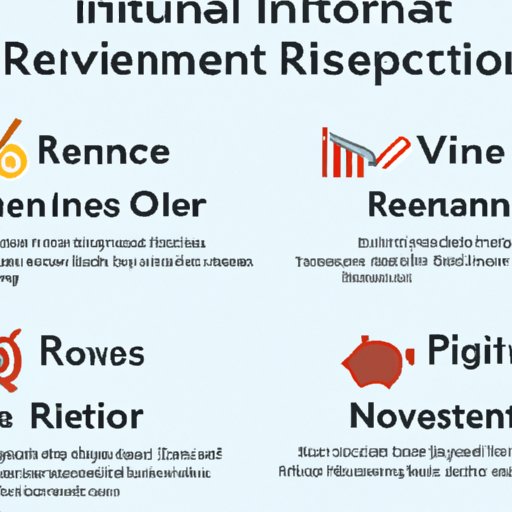Introduction
Retirement investing is one of the most important components of any financial plan. It can be a daunting task to figure out which type of investment is best for your retirement needs, especially if you are unfamiliar with the different types of investments available. In this article, we will explore the different types of retirement investments, examining the pros and cons of each, and provide advice on how to make the best investment decisions for your retirement.
Definition of Retirement Investing
Retirement investing is the process of making strategic investments to grow money for retirement. Retirement investing involves looking at long-term goals and working to build wealth over time. It can include a variety of different investments, from stocks and bonds to mutual funds and real estate. It is important to understand the different types of investments and how they work in order to make the best decisions for your retirement.

Overview of Different Types of Retirement Investments
The types of retirement investments you choose will depend on your individual needs and goals. Here is a brief overview of some of the most common types of retirement investments:
Stock Market Investing
Stock market investing involves buying and selling stocks on the stock exchange. Stocks are typically bought through a broker and traded on the open market. The goal of stock market investing is to buy stocks that will appreciate in value over time, allowing investors to make a profit when they sell their stocks. Investing in stocks carries a certain amount of risk, as the value of stocks can fluctuate significantly over time.
Bonds and Fixed-Income Investments
Bonds and fixed-income investments involve lending money to a company or government entity in exchange for regular payments (interest) over a set period of time. Bonds are generally considered safer investments than stocks, as they are less volatile and offer more stability. However, the returns on bonds and fixed-income investments tend to be lower than those of stocks.
Mutual Funds
Mutual funds are pooled investments managed by a professional investor. Mutual funds allow investors to spread their risk across a variety of investments, such as stocks, bonds, and other securities. Mutual funds typically have higher fees than other types of investments, but they can also provide higher returns in the long run.
Real Estate Investing
Real estate investing involves buying and managing properties for the purpose of generating income. Real estate investments can include residential properties, commercial properties, land, and even vacation rentals. Real estate investments can be lucrative, but they also require a significant amount of time and effort to manage.
Examining the Pros and Cons of Each Investment Type
Each type of retirement investment has its own set of pros and cons. Here is a closer look at some of the benefits and drawbacks of each type of retirement investment:
Stock Market Investing
Pros: Potential for high returns; ability to diversify investments; potential to increase profits through trading strategies.
Cons: High risk; potential for losses; need for expertise and knowledge of the stock market.
Bonds and Fixed-Income Investments
Pros: Low risk; steady returns; relatively safe investments.
Cons: Lower returns than stocks; limited potential for growth.
Mutual Funds
Pros: Diversified investments; potential for high returns; access to professional management.
Cons: Higher fees than other investments; potential for losses.
Real Estate Investing
Pros: Potential for high returns; ability to diversify investments; potential for tax advantages.
Cons: High risk; potential for losses; need for expertise and knowledge of real estate markets.

Consulting with Financial Professionals for Advice
When it comes to retirement investing, it is always a good idea to consult with a financial professional for advice. A financial advisor can help you determine which type of retirement investment is best for you based on your individual goals and needs. They can also help you develop a retirement investment plan that works for you.

Exploring Tax Advantages of Retirement Investing
One of the major benefits of retirement investing is the potential for tax advantages. Many types of retirement investments, such as 401(k)s and IRAs, are eligible for tax-deferred or tax-free growth. This means that you can defer taxes on the earnings from these investments until you retire, when you will likely be in a lower tax bracket. Consulting with a financial professional can help you determine which types of retirement investments offer the best tax advantages.
Investigating Low-Risk Investment Opportunities
For those who are risk-averse, there are a number of low-risk investment opportunities available. Certificates of deposit (CDs), money market accounts, and Treasury inflation-protected securities (TIPS) are all relatively safe investments that can provide a steady return.
Conclusion
Retirement investing is an important part of any financial plan. There are a variety of different types of retirement investments, each with its own set of pros and cons. It is important to do your research and consult with a financial professional for advice before making any investment decisions. Additionally, it is important to consider the potential tax advantages of retirement investing and investigate low-risk investment opportunities. With careful planning and the right investments, you can ensure that you are prepared for retirement.
(Note: Is this article not meeting your expectations? Do you have knowledge or insights to share? Unlock new opportunities and expand your reach by joining our authors team. Click Registration to join us and share your expertise with our readers.)
